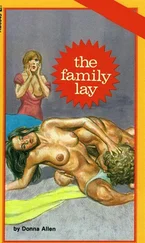The policeman went on, “I would argue that what we have here is not a locked-room mystery but an unlocked-house mystery . For the first time in months, this morning Bascom and Sorrel Ingrey unlocked their home and filled it with people, including my good self and your good selves. Before we all congregated in this drawing room, we were wandering about singly and in little groups, having a good old nosy and chatting to one another. One of us —not me, I hasten to add, being a policeman and therefore above suspicion—one of us stole the key to Perrine’s bedroom, went upstairs, unlocked her door, dismantled her bed and took it and her out of the house. But why did they take the bed too? That’s a real mystery! And did they take Perrine in order to punish her, or to let her escape justice?”
“We would have seen!” said Sorrel. “Someone would have seen someone else with Perrine and a load of bed pieces under their arm, moving through the house!”
“No, dear,” said Bascom. “ We wouldn’t have seen. You and I were in the kitchen serving breakfast right up until we moved through to this room. From where we were, we couldn’t see the hall or the front door.”
“Was anyone in the hall the whole time?” the policeman asked the assembled company. “Can anyone swear to me on the lives of their nearest and dearest that nobody went upstairs, and that nobody came down shortly or longly afterward with Perrine and the bits of bed in their grasp?”
Everyone started to talk at the same time, which made it hard to get the gist of what was being said, but it became clear in due course: nobody had been in the hall, or able to see the hall and the stairs, for the whole time.
“Aha!” said the policeman. “Then we have made some progress. We know now that my theory is perfectly possible.”
“How did this person get the key to Perrine’s bedroom?” asked Sorrel. “It was in my cardigan pocket. It was there just now, when I came upstairs with you, when you were going to arrest Perrine.”
“Whoever took it must have replaced it,” said the policeman. “Though I admit it’s a bit odd that you didn’t notice anyone reaching into your pocket, Mrs. Ingrey.”
“Mum, you weren’t wearing your cardy when you were sorting out the breakfast,” said Allisande. “I remember, because there was a stain on your shirt, on the right shoulder. I thought to myself, ‘Mum looks a total scruff, I wish she’d put her cardy back on.’ ”
“She’s right!” blurted out Mrs. Sennitt-Sasse. “It looked like a coffee splash. I saw it too.”
“Yes, I remember now,” said Sorrel distantly, as if busy trying to coax the whole memory out of a dark and cobwebby corner of her mind. She pulled her cardigan down on the right-hand side, and everyone saw the stain that had been described. “Yes, I did take my cardy off. I remember now. I hung it on one of the coat hooks in the hall before I started in the kitchen.”
“There you are, then!” said the policeman. “Anyone could have gotten to it, unseen in the hall.”
“This all seems laughably unlikely.” Mr. Careless proved his point by laughing. “No one would be able to do all this unnoticed: sneak upstairs, somehow dispose of a girl, not to mention a bed, which one would first have to dismantle. It’s preposterous! There were people milling about all over the place—someone would have seen something.”
“How would the person have known that the key to Perrine’s room was in your cardigan pocket?” Bascom asked Sorrel. “Only the family knew that.”
The policeman stared hard at Lisette and Allisande. “Girls?” he said. “Does either of you have anything you want to share with us?”
“No,” said Allisande aggressively. “I didn’t do it! I would never bother to dismantle a bed, for any reason whatsoever. It would be a major hassle.”
“She’s telling the truth,” said Lisette. “I could see her the whole time. She didn’t go upstairs and set Perrine free. Or kill Perrine and hide her body in another part of the house.”
The phone started to ring at that moment. Sorrel gave Bascom a weary look. “I’ll get it,” he said.
“ ‘Set her free, or kill her and hide her body,’ ” mused the policeman, repeating Lisette’s words. “That’s the real question, isn’t it? Which one was it? If the former, we might never find Perrine. If the latter, we will no doubt find her body either hidden somewhere here, in the grounds of Speedwell House, or locked in the boot of someone’s car.”
“We should check all the car boots quickly!” said Lisette. “What if Perrine’s trapped in one of them still alive? Maybe whoever took her is planning to kill her later because they didn’t have time this morning.”
Everyone looked at Mrs. Dodd, who said, “I wish I did have her locked in my car boot so that I could make her suffer later as much as she’s made me suffer . . . but I’m afraid I don’t. Check if you don’t believe me.”
“On balance, I think I do believe you,” said the policeman. “I have a question for you, miss.”
Allisande nudged Lisette, who looked up and saw that the policeman was talking to her. “Yes?” she said. She hadn’t noticed because she had an idea in her head that wouldn’t go away.
“You mentioned that you could see your sister Allisande the whole time, so therefore she cannot be the culprit. Correct?”
“Yes,” said Lisette.
“Very good. My question is this: Could she see you the whole time?”
But before Lisette, or indeed Allisande, could answer, Bascom Ingrey came back into the drawing room. In fact, it would be most accurate to say that he staggered in. His face looked like a slab of old gray meat. “That was the police station,” he said. “Perrine has been found dead. Murdered!”
13
Anne’s more than my sister,” Sarah Parsons tells me. We’re standing in her gallery, looking at the Anne, Tide Glider painting on the wall. “In a way, I’ve always regarded her as my creator. If it weren’t for her, I wouldn’t exist.” She giggles. I was expecting it. Her laughter doesn’t mean she finds something funny, I’ve discovered; it’s a signal that she’s finished speaking. It would be interesting to see if she did it after saying, “I’m bankrupt and about to lose my house.” Maybe she has a different punctuation-behavior for sad conversations.
She’s a short, round woman in her midthirties, with a mass of brown, curly hair, and—thank God—no reservations about inviting a stranger into her home. I emailed her via her website and said I loved her paintings, and could I come and look at them with a view to buying one? It worked.
Sarah lives on Fore Street in Totnes in a narrow three-story building that’s squashed in between a shop that sells crystals and a real estate agent. The ground floor is where the paintings are: all hers, no one else’s. Above is her home, spread over the top two floors. We’ve just had tea up there: delicious Earl Grey, complete with shiny silver contraptions to catch the twiggy bits. The teabag tea I have at home doesn’t taste as good but is less fiddly to make and pour.
“How did Anne create you?” I ask Sarah. She seems happy to talk about her family and strikes me as an exuberant innocent. Bare feet, no makeup. On the middle toe of her right foot, she’s wearing a ring with a big red heart on it. As we chat, she swishes the skirt of her long blue silk dress from one side to the other, like Ellen used to when she was three and dressed as a Disney princess.
“My mum turned up at school to collect Anne one day, and another mother congratulated her—told her how fantastic she was looking, how excited she must be, and why was there no sign of a bump yet? Turned out Anne had told the whole school her mum was preggers with twins. Twins! Anne was quite lonely being the only child, and our parents weren’t showing any signs of supplying a sibling, so she invented two of them. When Mum heard about Anne’s lie, she felt guilty for depriving her of what she so obviously wanted, had a word with Dad, and . . .” Sarah stretches out her skirt on both sides, like low-down wings, and does a little curtsy. “Voilà! Here I am, thanks to my older sister.”
Читать дальше











